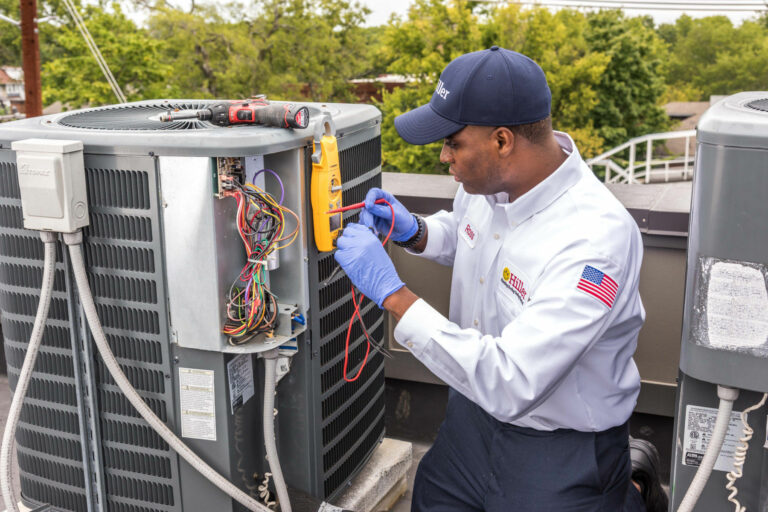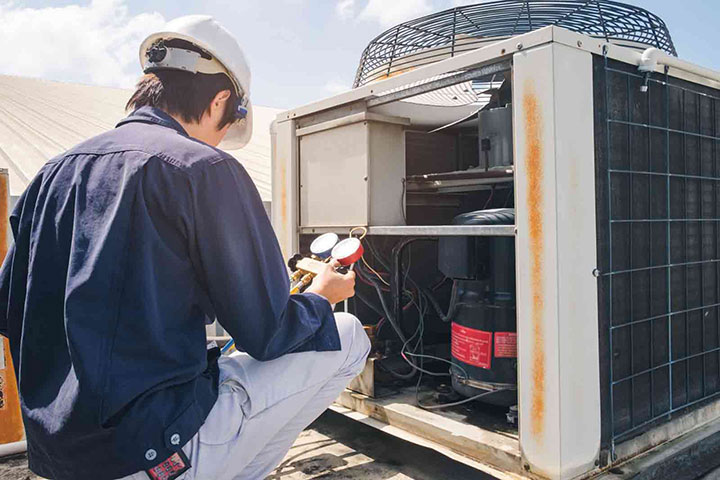Installing ductless mini splits: A Smart Move for Energy-Efficient Living
Installing ductless mini splits: A Smart Move for Energy-Efficient Living
Blog Article
Picking In Between a Heatpump and Furnace: Key Factors To Consider for Your Cooling And Heating Demands
When examining heating options for cooling and heating requires, the decision between a heatpump and a furnace can be intricate. Each system provides distinct advantages customized to particular environments and power effectiveness objectives. Recognizing these differences is necessary for making an educated selection. Secret factors such as installment costs and ecological effect further make complex the selection procedure. Which option absolutely lines up with one's comfort and sustainability preferences? The following sections will certainly explore these factors to consider in information.
Comprehending Warmth Pumps: How They Work and Their Benefits
While lots of homeowners consider various heating alternatives, understanding exactly how heat pumps feature and their benefits can significantly affect their choice. Warm pumps run by transferring warmth instead of producing it. In the winter months, they extract warm from the outdoors air or ground and move it indoors, while in the summertime, they reverse this process, cooling the home by removing warm outside. This dual functionality makes them flexible for year-round environment control.One of the primary benefits of heatpump is their power efficiency. They utilize substantially much less electrical power compared to standard home heating systems, possibly causing lower utility bills (heat pump service). Furthermore, warmth pumps have a smaller sized carbon impact, making them an eco-friendly choice. They additionally need less upkeep than standard systems, adding to long-term cost savings. Overall, understanding the mechanics and benefits of heatpump can aid home owners make notified choices concerning their home heating and cooling requirements
Checking Out Furnaces: Types, Procedure, and Benefits
Heating systems can be found in various kinds, including gas, electric, and oil models, each with distinct functional systems. Comprehending these differences is necessary, as they affect efficiency and heating efficiency. Furthermore, furnaces offer countless advantages, such as constant heat result and integrity in chillier environments.
Kinds of Heating systems
Heating systems can vary substantially in design and procedure, with heaters being a prominent selection amongst property owners. There are several kinds of heating systems, each making use of different gas resources and technologies. Gas heaters are typical, leveraging all-natural gas to produce heat successfully. Electric heating systems, on the various other hand, use electrical resistance to generate warmth, commonly preferred for their straightforward setup. Oil heating systems, while much less common, are effective in locations with minimal gas access (ductless mini splits). In addition, condensing furnaces maximize energy performance by capturing and recycling exhaust gases. Each type runs through a system of warm exchangers and ductwork to disperse cozy air throughout a home. Understanding the differences in between these furnace types is crucial for informed a/c choices
Benefits of Furnaces
For property owners seeking reputable warmth during chilly months, the advantages of heating systems are considerable. Heaters provide constant home heating, making certain also temperature levels throughout the home. They are especially reliable in severe cool, often outshining heatpump in frigid conditions. Various types, including gas, electric, and oil furnaces, offer adaptability to meet diverse needs and preferences.Furnaces additionally often tend to have lower preliminary installment prices contrasted to warm pumps, making them an extra obtainable alternative for many. Their durable design contributes to a longer lifespan, with several systems lasting over 15 years with proper maintenance. In addition, contemporary furnaces are often outfitted with sophisticated technology for improved effectiveness, which can bring about minimized energy costs. Overall, heating systems remain a reliable option for effective home heating.

Power Efficiency: Contrasting Warm Pumps and Furnaces
When contrasting power effectiveness between warm pumps and furnaces, the Seasonal Energy Effectiveness Ratio (SEER) plays a crucial function in identifying efficiency. In addition, a functional price analysis discloses the long-term monetary effects of each system. Recognizing these aspects can guide property owners in making informed choices regarding their home heating solutions.
Seasonal Power Effectiveness Ratio
Power efficiency plays an important duty in the decision-making procedure between warm pumps and heaters, especially when considering the Seasonal Energy Performance Ratio (SEER) This metric actions the cooling efficiency of warm pumps over a whole air conditioning season, offering a standardized means to review performance. Greater SEER rankings show higher energy performance, converting to reduced energy consumption and reduced utility costs. In contrast, heating systems are typically evaluated utilizing the Annual Gas Application Efficiency (AFUE) rating, which shows heating effectiveness. When comparing these two systems, property owners ought to prioritize SEER scores for heatpump, as they straight influence total power savings and environmental sustainability. A thorough understanding of SEER can significantly affect the long-lasting fulfillment and cost-effectiveness of the picked cooling and heating solution.
Functional Cost Analysis
Understanding the operational costs related to heatpump and heaters is crucial for homeowners evaluating their alternatives. Warmth pumps usually supply higher energy performance, converting electric energy right into warmth with marginal waste. This leads to lower monthly energy costs, particularly in modest environments. On the other hand, standard furnaces, especially gas designs, may have lower ahead of time costs but can sustain greater functional costs over time due to fuel prices and efficiency ratings.Moreover, heat pumps can function as both heating and cooling systems, possibly minimizing the demand for different HVAC systems. While initial financial investments for heatpump might be higher, their lasting savings in power performance can make them a much more affordable selection for many households. Mindful analysis of neighborhood energy rates is important to figure out the very best choice.
Setup Expenses: What to Anticipate for Each Heating Unit
Setup prices for home heating systems can vary substantially in between heatpump and furnaces, influencing property owners' decisions. Heat pumps generally have greater in like it advance installation expenses, commonly varying from $3,500 to $8,000, depending upon the device dimension and complexity of setup. This consists of the exterior system, interior handling system, and needed ductwork alterations. Conversely, heating systems have a tendency view website to have reduced first costs, balancing between $2,500 and $6,000, which can be appealing for budget-conscious homeowners. Installment costs can enhance if substantial ductwork is required.Moreover, the selection of fuel type for furnaces-- natural gas, lp, or electrical-- can additionally affect installation prices. While heat pumps offer power efficiency, their first financial investment may hinder some purchasers. Ultimately, reviewing setup prices together with long-term financial savings and effectiveness will help homeowners in making educated decisions regarding their heating systems.
Environment Considerations: Which System Does Better in Your Area
Just how do climate problems affect the efficiency of furnace? The efficiency of heatpump and furnaces can vary greatly depending upon the neighborhood climate. In modest environments, heat pumps stand out by successfully transferring warm from the outdoors air, making them an energy-saving option. However, their performance lessens in exceptionally cold temperature levels, where they might have a hard time to draw out enough warmth. Alternatively, furnaces, particularly gas designs, supply dependable and constant warmth no matter outdoor conditions, making them more suitable in colder regions.In areas that experience milder winter seasons, warm pumps can operate successfully year-round, supplying both heating & cooling. In comparison, areas with extreme winters months typically gain from the toughness of heaters. Inevitably, recognizing the neighborhood environment is necessary when determining in between a warm pump and a heating system, as it directly affects their functional performance and total performance.
Upkeep Requirements: Long-Term Look After Heat Pumps vs. Furnaces
While both warm pumps and heating systems need normal upkeep to ensure peak efficiency, their certain needs and treatment routines vary considerably. Heaters generally require less frequent interest, with annual assessments sufficing to examine for gas leaks, tidy filters, and assess general functionality. Their easier design commonly enables simple repairs.In contrast, heatpump demand biannual upkeep as a result of their double duty in cooling and heating. This includes cleansing coils, checking cooling agent degrees, and ensuring that both the outdoor and indoor devices function at their best. In addition, heat pump maintenance usually involves even more detailed components, making expert maintenance essential.Neglecting maintenance can result in diminished performance and boosted energy prices for both systems. Eventually, homeowners ought to think about these lasting treatment needs when choosing in between a heatpump and a heater, as aggressive maintenance can extend the lifespan and performance of either system significantly.
Ecological Effect: Picking a Lasting Home Heating Alternative
The ecological influence of home heating systems is an essential assessment for house owners looking for lasting choices. Warmth pumps are usually extra energy-efficient than traditional furnaces, as they move warm as opposed to create it, substantially decreasing carbon discharges. By using eco-friendly energy resources, such as air-source or geothermal warm pumps, house owners can additionally minimize their environmental footprint.On the other hand, gas heaters send out greenhouse gases and add to air pollution, though they typically give higher heat outcome. Developments in technology have actually led to the advancement of high-efficiency heaters that lessen emissions.Ultimately, selecting a home heating system includes weighing performance against ecological impact. Home owners are motivated to reflect on regional energy sources and incentives for sustainable systems, ensuring an option that straightens with both personal convenience and ecological obligation. The choice affects not just immediate convenience but likewise long-term sustainability and ecological health.
Often Asked Inquiries
How Much Time Do Heat Pumps and Furnaces Commonly Last?
The lifespan of warm pumps typically varies from 15 to 20 years, while heaters can last in between 15 to thirty years. Regular upkeep significantly affects their long life and effectiveness in offering home heating remedies.
Can I Use a Warm Pump in Incredibly Cold Climates?
Warmth pumps can run in extremely cold climates, however their performance diminishes as temperatures decrease. In such problems, extra home heating resources might be necessary to maintain comfortable indoor temperatures and ensure peak efficiency.

What Is the Sound Level of Warm Pumps Versus Furnaces?
The Discover More Here sound levels of heatpump and heaters vary considerably. Usually, heatpump run more silently than standard furnaces, making them preferable for those conscious sound, while heaters may generate louder operational sounds during home heating cycles.
Are Heat Pumps Suitable for Both Heating & Cooling?
Heatpump are undoubtedly suitable for both heating & cooling (furnace replacement). They work by moving warm, providing effective temperature level control year-round, making them a versatile selection for property owners seeking an all-in-one heating and cooling remedy
What Size Home Heating System Do I Required for My Home?
Determining the proper dimension heating system for a home requires examining factors such as square video footage, insulation top quality, local climate, and the home's design. Consulting a specialist can guarantee an accurate evaluation and excellent comfort. Heat pumps normally supply higher energy efficiency, converting electric energy into warmth with minimal waste. In moderate climates, heat pumps excel by effectively moving warmth from the outdoors air, making them an energy-saving alternative. Alternatively, furnaces, particularly gas models, offer trusted and consistent warm regardless of outside conditions, making them better in colder regions.In areas that experience milder wintertimes, heat pumps can operate successfully year-round, giving both heating and cooling. Warm pumps are typically much more energy-efficient than conventional furnaces, as they transfer warmth instead than create it, considerably minimizing carbon discharges. By using renewable energy resources, such as air-source or geothermal warm pumps, property owners can additionally reduce their ecological footprint.On the various other hand, all-natural gas heating systems release greenhouse gases and contribute to air pollution, though they usually supply higher heat result.
Report this page